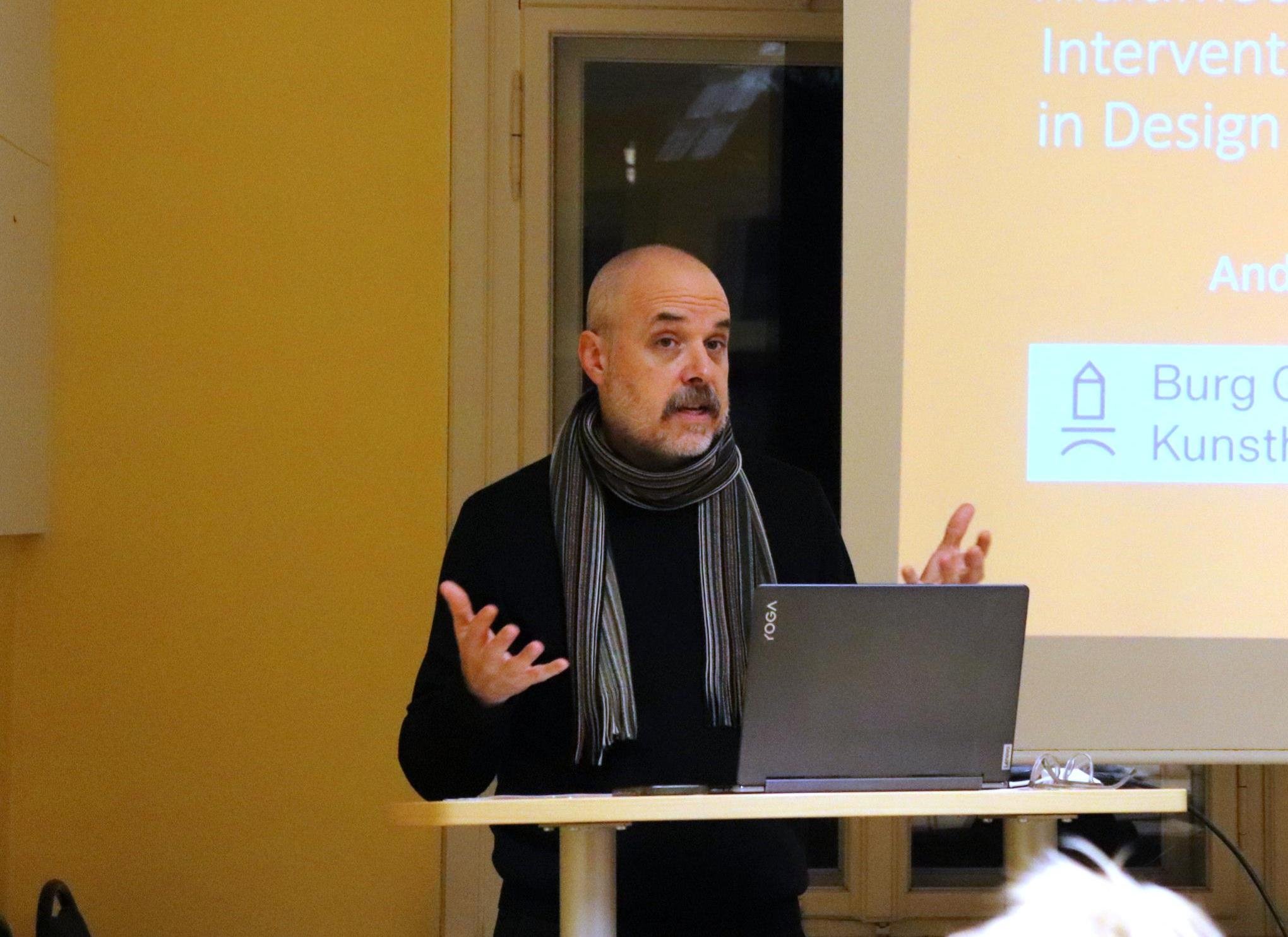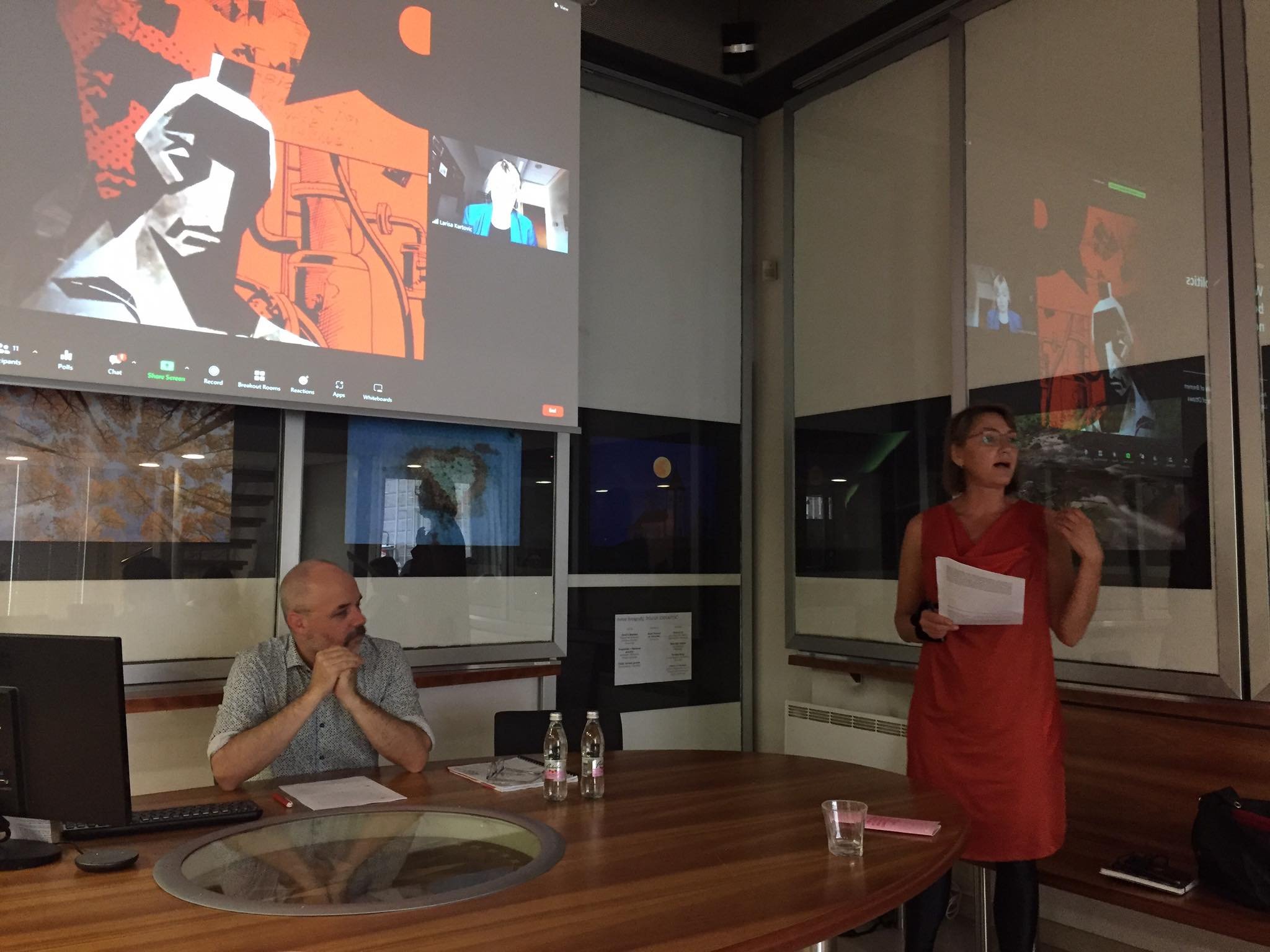
Multimodality, Activation, Intervention: Adventures in Design + Anthropology
Andrew Gilbert presented a talk at Martin-Luther University of Wittenberg-Halle, which partially featured Reclaiming Dita project.
Andrew Gilbert presented a talk at Martin-Luther University of Wittenberg-Halle, which partially featured Reclaiming Dita project.

A talk with Larisa Kurtović and Andrew Gilbert, sponsored by the Sociology and Anthropology Graduate Students Association and the Laboratory for Engaged Research.
Talk for the Colloquium Series “other Waves in Anthropological Research” at the Institute for European Ethnology at Humboldt University
On September 15 Andrew Gilbert and Larisa Kurtović present their research on worker struggles in post-socialist Bosnia and Herzegovina at the symposium Memory Culture in Flux: From Post-Yugoslavia to Conceptual Problems, organized by the Inštitut za kulturne in spominske študije ZRC SAZU in Ljubljana


We are delighted to announce the publication of our article “Labours of Representation: A Bosnian Workers’ Movement and the Possibilities of Collaborative Graphic Ethnography,” available as an Open Access publication in the journal Anthropologica. It is part of a thematic section entitled Otherwise: Ethnography, Form, Change. https://cas-sca.journals.uvic.ca/index.php/anthropologica/article/view/361
Presentation at the Anthropology Research Seminar, Seminarraum F-121, Lerchenweg 36, University of Bern. With Andrew Gilbert and Larisa Kurtović. Chaired by Michaela Schäuble, and Jose Sherwood as discussant.
In this presentation at the annual meeting of the German Society for Social and Cultural Anthropology, Andrew Gilbert and Larisa Kurtovic draw upon our graphic ethnography project to explore the affordances of sequential art for urban anthropology. Our research investigates an unprecedented victory by industrial workers in the northern Bosnian city of Tuzla, who occupied and preserved their privatized and bankrupted factory and were able to restart production. We propose that the graphic medium offers unique ethnographic potential for capturing and communicating the openly experimental and collaborative nature of the workers struggle, offering important insights for an urban anthropology “understood as operating within an open system, as an open system, and as the study and production of open systems” (Fortun 2003). In particular, we explore graphic ethnography's capacity to materialize and render tangible a broad urban sensorium, to evoke how the social multiplicities of cities can be turned into a political resource, and to harness the imagination and participation of readers in ways that keeps ethnography as inventive and open-ended as the urban worlds that it evokes.
In this short article, we describe some of the aims and elements of our graphic ethnography-in-progress. You can find a link to the on-line version here: https://www.anthropology-news.org/issue/graphic-ethnography/.
This presentation by Andrew Gilbert was part of a workshop entitled “Anthropology beyond text? Experiments, devices and platforms of multimodal ethnographic practice” organized by the Stadtlabor for Multimodal Anthropology, Humboldt University, Berlin
“Emergent Conversations: Political Action and Generations.” Political and Legal Anthropology Review. Parts One, Two, & Three. As mass demonstrations mobilized against racial injustice in the U.S. and globally, Nataša Garić-Humphrey, Andrew Gilbert, Azra Hromadžić, and Larisa Kurtović took part in a virtual discussion of political and social movements, drawing from their extensive ethnographic research in Bosnia-Herzegovina. Their discussion explores the complex interplay of history, social movements, and generational change, and how anthropological theory engages with these phenomena. This discussion was moderated by PoLAR Associate Editor Jennifer Curtis.
Article by Larisa Kurtović. “When All That Is Solid Does Not Melt into Air: Labor, Politics and Materiality in a Bosnian Detergent Factory” in PoLAR. Political and Legal Anthropology Review.
Abstract. Can futures be assembled out of ruins? This article engages this question through an ethnographic account of a workers’ struggle in northeastern Bosnia‐Herzegovina to restart production in a bankrupted factory almost destroyed by privatization. From 2011 through 2015, workers of Dita organized to challenge liquidation of the factory assets. Their struggle resulted in an unprecedented victory when production was restarted in 2015 and the factory reprivatized in 2017. Workers had to carry out their struggle amidst two opposing pulls: the need to draw attention to the processes of destruction that formed part of postwar privatization, and to simultaneously argue for the factory's continued value and viability. The analysis explores the openings and risks created by the ongoing anthropological debates on the centrality of matter—and especially ruins—to social life at large. It argues that where we locate potential and how we name embattled matter is not merely a theoretical but also a political question.
Collaborative multi-media panel “How Do We Work Together? Distribution, Political Labor, and Worker Struggles in Bosnia and Herzegovina” for Distribute 2020, Biannual Conference of Society for Cultural Anthropology and Society for Visual Anthropology (with Larisa Kurtović, Damir Arsenijević, Jasmina Husanović, Boris Stapić, Sanja Horić, Haris Husarić & Azra Jašarević) An elaboration of how this panel can be used in teaching can be found here.
Presentation by Andrew Gilbert (Cancelled)
Presentation by Andrew Gilbert
Roundtable for the Annual Meeting of the American Anthropological Association, Changing Climates: Struggle, Collaboration, and Justice
November 20-24, 2019, Vancouver, British Columbia
casca-aaa-2019.com/
“Care, Publicity, and Worker Politics in Late Industrial Bosnia-Herzegovina”. Exertions. Society for the Anthropology of Work. (Photo Essay, with Haris Husarić)
Graduate Institute of International and Development Studies (Geneva, Switzerland)
with Andrew Gilbert, Larisa Kurtović and Boris Stapić, organized by Radnički univerzitet
English title: Engaged Comics—the Story of Dita
Ethnography Lab, University of Toronto, with Andrew Gilbert, Larisa Kurtović and Boris Stapić
https://ethnographylab.ca/2019/03/28/anthropology-and-the-graphic-form-collaborative-research-on-labor-politics-in-post-socialist-bosnia-herzegovina/
With Andrew Gilbert and Larisa Kurtović
Annual Meeting of American Anthropological Association, Change in the Anthropological Imagination: Resistance, Resilience, and Adaptation
San Jose, California, November 14-18, 2018
with Andrew Gilbert and Larisa Kurtović